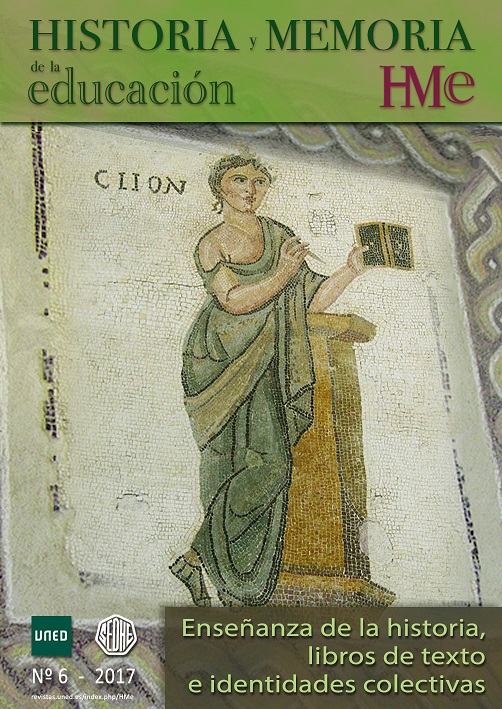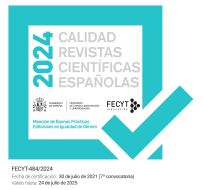Práticas pedagógico-didáticas e a sua influência na configuração do espaço escolar. A materialidade das escolas de ensino mútuo em Portugal à luz dos diretórios do método (1835-1844)
DOI:
https://doi.org/10.5944/hme.6.2017.17174Parole chiave:
Circulação do conhecimento pedagógico. Ensino mútuo. Materiais impressos. Materialidade da escola.Abstract
Nas primeiras décadas do século xix o método ou modelo de ensino mútuo gera ampla discussão pedagógica em vários países (a sua difusão transcontinental não tem mesmo precedentes). Não obstante ter passado rapidamente pela paisagem pedagógica, exerce uma influência decisiva na definição de uma organização pedagógica específica para a escola primária pública, levando à superação (irreversível) do ensino individual e à legitimação do ensino simultâneo.
Num primeiro momento, à luz de investigação já produzida, procuro contextualizar de que forma se deu em Portugal a receção do método, relevando a pluralização de interpretações dessa tecnologia educativa no curso da sua difusão mundial.
Num segundo momento, recorrendo a materiais impressos – no caso, dois diretórios do método redigidos em Portugal (1835 e 1844) – e aos dados neles plasmados a respeito da materialidade das escolas (em causa, entres as datas assinaladas, não apenas as mudanças que se observam mas também as continuidades), argumento uma ideia central: a de que as práticas pedagógico-didáticas, se preferirmos, a interação professor / alunos em situação de ensino e de aprendizagem, têm uma influência decisiva na evolução e configuração dos espaços escolares.
Downloads
Riferimenti bibliografici
Bandini, Gianfranco. «From Tutor to Teacher: The Birth of Popular Schooling in Early 19th Century Italy». In Classroom Struggle. Organizing Elementary School Teaching in the 19th Century, edited by Marcelo Caruso, 205-228. Frankfurt: Peter Lang, 2015.
Barroso, João. «O Século da Escola: do Mito da Reforma à Reforma de um Mito». In O Século da Escola. Entre a Utopia e a Burocracia, edited by Teresa Ambrósio, Eduardo Terren, Daniel Hameline and João Barroso. Porto: Editora ASA, 2001.
Barroso, João. «Innovation and change in school: challenges to teachers and architects». Education Buildings and Equipment 28 (2002).
Beech, Jason, and Alejandro Artopoulos. «Interpreting the circulation of educational discourse across space: searching for new vocabularies». Globalisation, Societies and Education 14 (2) (2016): 251-271.
BFSS Annual Report, 1824.
Burg, Martijn van der. «Cultural and legal transfer in Napoleonic Europe: codification of Dutch civil law as a cross-national process». Comparative Legal History 33 (1) (2015): 85-109.
Burke, Catherine, and Ian Grosvenor. School. London: Reaktion Books, 2008.
Caruso, Marcelo. «Locating Educational Authority: teachers monitors, educational meanings and the importing of pedagogical models. Spain and German States in the Nineteenth Century». In Educational Police Borrowing: historical perspectives, edited by David Phillips and Kimberly Ochs, 59-87. Oxford: Symposium Books, 2004.
Caruso, Marcelo, ed. Classroom Struggle. Organizing Elementary School Teaching in the 19th Century. Frankfurt: Peter Lang, 2015.
Caruso, Marcelo, ed. Globalization and Printing. An International Research Guide for the History of the Bell-Lancaster System of Mutual Teaching in the 19th Century. Berlim: manuscrito, 2007.
Caruso, Marcelo. «New Schooling and the Invention of a Political Culture: Community, Rituals and Meritocracy in Colombian Monitorial Schools, 1821-1842». In Imported Modernity in Post-Colonial State Formation. The Appropriation of Political, Educational, and Cultural Models in the Nineteenth-Century Latin America, edited by Marcelo Caruso and Eugenia Roldán Vera, 277-306. Frankfurt: Peter Lang, 2007.
Cássia Gonçalves, Rita de. Arquitetura Flexível e Pedagogia Ativa: um (des)encontro nas escolas de espaços abertos. Lisboa: Instituto de Educação da Universidade de Lisboa, 2011.
Cuban, Larry. How Teachers Taught. Constancy and Change in American Classrooms 1890-1990. New York e London: Teachers College Press, 1993.
Duarte, Alexandra, Luísa Veloso and Joana Marques. «Changing education through learning spaces: impacts of the Portuguese schools buildings’ renovation programme». Cambridge Journal of Education 44 (3) (2014): 401-423.
Fernandes, Rogério. «A difusão do ensino mútuo em Portugal no começo do século XIX». In A escola elementar no século XIX. O método monitorial / mútuo, organizadores Maria Helena Câmara Bastos and Luciano Mendes de Faria Filho, 25-43. Passo Fundo: EDIUPF, 1999.
Hamilton, David. Towards a Theory of Schooling. London: The Falmer Press, 1989.
Herman, Frederik, Angelo Van Gorp, Frank Simon, Bruno Vanobbergen and Marc Depaepe. «Modern architecture meets new education. Renaat Braem’s design and the Brussels Decroly school». Revue Belge d’Histoire Contemporaine XLI (2011).
Howlett, Peter, and Mary S. Morgan, eds. How well do facts travel? The dissemination of reliable knowledge. New York: Cambridge University Press, 2011.
Lawn, Martin, and Ian Grosvenor. Materialities of schooling: Design, technology, objects, routines. Oxford: Symposium Books, 2005.
Magalhães, Justino. Da Cadeira ao Banco. Escola e Modernização (Séculos XVIII-XX.) Lisboa: Educa/Unidade de I & D de Ciências da Educação, 2010.
Manique da Silva Carlos. «Circulating the Monitorial System of Education. The Portuguese Teacher Alexandre Luís da Cunha in the Atlantic World». In Zirkulation und Transformation. Pädagogische Grenzüberschreitungen in Historischer Perspektive, edited by Marcelo Caruso, Thomas Koinzer, Christine Mayer e Karin Priem, 177-190. Colónia: Böhlau, 2014.
Manique da Silva, Carlos. «Do modo de aprender e de ensinar. Renovação pedagógica e cenários de experimentação da escola graduada (1834-1892)». Phd diss., Lisboa: Faculdade de Psicologia e de Ciências da Educação da Universidade de Lisboa, 2008.
Manique da Silva, Carlos. «O papel dos materiais impressos na difusão do ensino mútuo: duas traduções portuguesas da obra “Sistema Britânico de Educação”, de Joseph Lancaster». In Influencias inglesas en la Educación Española e Iberoamericana (1810-2010), edited by José María Hernández Díaz, 629-639. Salamanca: Universidade de Salamanca, 2011.
Markus, Thomas. Buildings & Power. Freedom and Control in the Origin of Modern Building Types. New York: Routledge, 1993.
Martinho, Miguel, and José Freire da Silva. «Open Plan Schools in Portugal: Failure or Innovation?». PEB Exchange 12 (2008).
Novo Diccionario da Lingua Portugueza. Lisboa: Typografia Rollandiana, 1806.
Querrien, Anne. L’école mutuelle: une pédagogie trop efficace?. Paris: les Empêcheurs de penser en rond, 2005.
Ramos do Ó, Jorge, and Luís Miguel Carvalho. Emergência e circulação do conhecimento psicopedagógico moderno (1880-1960). Estudos comparados Portugal-Brasil. Lisboa: Educa e Unidade de I & D de Ciências da Educação, 2009.
Roldán Vera, Eugenia. «From Monitorial to Graded Schooling in 19th Century Mexico: Politics and Pedagogy in the Definition of Modern Education». In Classroom Struggle. Organizing Elementary School Teaching in the 19th Century, edited by Marcelo Caruso,183-184. Frankfurt: Peter Lang, 2015.
Roldán Vera, Eugenia. «Order in the Classroom: the Spanish American Appropriation of the Monitorial System of Education». Paedagogica Historica 41 (6) (2005): 655-675.
Roldán Vera, Eugenia. «The Monitorial System of Education and Civic Culture in Early Independent Mexico». Paedagogica Historica 35 (2) (1999).
Systema Britânico de Educação. Porto: Typ. da Viúva de Alvarez Ribeiro e Filhos, 1823.
The British System of Education. London: Joseph Lancaster and Longman Co. Paternoster-Row, 1810.
Tondeur J., E. de Bruyne, M. Van Den Driessche, S. McKenney and D. Zandvliet. «The physical placement of classroom technology and its influences on educational practices». Cambridge Journal of Education 45 (4) (2015): 537-556.
Tyack, David, and Larry Cuban. Tinkering toward Utopia: a century of public school reform. Cambridge, MA: Harvard University Press, 1995.
Viñao Frago, Antonio, and Agustín Escolano Benito. Currículo, espaço e subjetividade: a arquitetura como programa. Rio de Janeiro: DP&A, 2001.
##submission.downloads##
Pubblicato
Come citare
Fascicolo
Sezione
Licenza
Authors who publish in Historia y Memoria de la Educación agree to the following terms:
- Authors retain copyright and grant the journal right of first publication with the work simultaneously licensed under a Creative Commons Attribution-NonCommercial 4.0 International that allows others to share the work with an acknowledgement of the work's authorship and initial publication in this journal.
- Authors are able to enter into separate, additional contractual arrangements for the non-exclusive distribution of the journal's published version of the work (e.g., post it to an institutional repository or publish it in a book), with an acknowledgement of its initial publication in this journal.
- Authors are permitted and encouraged to post their work online (e.g., in institutional repositories or on their website) prior to and during the submission process, as it can lead to productive exchanges, as well as earlier and greater citation of published work (See The Effect of Open Access).










